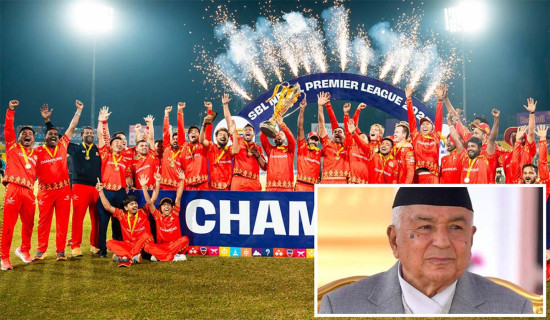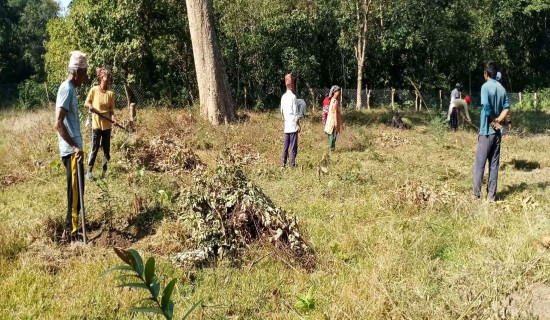- Sunday, 14 December 2025
Presidential Poll Bolsters Republic
The election of the third president on March 9 signals furthering the process of the institutionalisation of the republican order which began in 2008 following the abolition of the 240-year-old monarchy by the Constituent Assembly. The electoral college for the election of president and vice president consists of the members of federal parliament and seven provincial assemblies of the country which carry different voting weightage. Under the constitution, President is the symbol of national unity, acts as the custodian of constitution and guardian of the nation. President is the supreme commander of the Nepal Army. Though the position is ceremonial, yet the constitution mandates dozens of works and responsibilities to the President. Article 95(1) of statute provides that the President shall address the House of Representatives (HoR) and present government’s policies and programmes to a joint sitting of the both Houses of Parliament.
In case of a hung house, where no party gets a majority in the HoR, and no leader emerges as the PM within 30 days of the final result of the election, or if appointed PM fails to receive a vote of confidence, President shall appoint a member as Prime Minister who produces the bases for winning the vote of confidence in the HoR. The election of the senior leader of Nepali Congress (NC) Ram Chandra Paudel to the highest position is considered the victory of moderation and pragmatism. Paudel actively involved himself in the seven decades long incessant and arduous democratic struggle. In addition, he is regarded as among the primary thought leaders with respect to the value of democracy and democratic socialism. He is a kind of the dyed in the wool - who spent his entire political career - schooled in democracy and democratic socialism under the watch of the NC founding leaders led by BP Koirala.
A man of consistency
Paudel was elected from Tanahu to the HoR multiple times and also worked as minister several times holding portfolios, including that of Local Development, Home, Peace and Development Ministries. He was elected as speaker of the HoR. He is a man of consistency, clarity, and discipline strictly adhering to the democratic pluralism. Paudel’s elevation to the high office is taken as the solidification of the process of the democratic republic installed after the last king Gyanendra chose to trample the 1990 constitution declaring himself as the executive of the country on the pretext of controlling ongoing Maoist insurgency. King’s move incredibly shrunk the political centre pushing political parties towards the extremes.
Paudel’s presidency comes at a time when there has been an unprecedented disappearance of the middle ground in the mainstream politics and legislatures, and dilution of the ideological principles. Paudel always stood the middle ground in politics, advocating essential democratic values of a compromise, persuasion and consent along with tolerance and respect for huge diversity in society. As the far right and far left widened their space, at times, to quote American political scientist and close Nepal watcher Leo E. Rose, “encouraged by the Royal Palace,” to counter the influence of the NC, and gained strength at the cost of political centre, country finds it increasingly difficult to get things done for the people centred on the larger national interests.
The net result is politics has gone bitter and toxic. Like it or not, a very few people and politicians are willing to stand on the middle ground as it does not entertain populism, xenophobic and jingoistic politics with catchy slogans and momentary solutions for complex problems. They are seen easily giving in to crowds’ pressures for a more radical strategy. The country is tired of domestic extremes - far left and far right. The political centre seems exhausted of trying to tame these radicals in democratic schooling, and swayed by utopian ideologies, catchy slogans and solutions to complex problems without knowing where it would lead to for the people and the country that sensitively sits between the two big neighbours and emerging global powers, with close attention of faraway superpower and other global powers.
Given his background of deep involvement in democratic struggle, experiences, and also as a thought leader in democratic pluralism, the country can heave a sigh of relief to have Paudel as the President in this critical and complex challenging time. Centrists are in minority, often remain plagued by the anxieties and confused by contradictory narratives created by the extremes. Today’s need is to pull politics to the centre and widen its space. Political centre while staying on an orderly, dignified and principled political sphere should work to contain the radicalism of both the left and right, set aside the high polarisation of politics and bridge widening divisions that have bedevilled the country in recent years. Democracy has to be defended against all kinds of extremes to preserve the unity and integrity of the nation.
Dignity of President’s office
An influential section of society puts blame on the constitution written by Constituent Assembly. Had it not been promulgated in 2015, the country would have confronted a constitutional vacuum, which would have invited challenges beyond imagination. The constitution may look like a document of political parties with a bundle of contradictions, yet the country has at least a document to work with and improve where necessary. Since 2008, the country saw eight Prime Ministers. It is the making of entrenched mercurial behaviour of political leaders, horse-trading, and unlimited greed and avarice for power and pelf. This is not only corroding the foundation of democracy; it is eating the vitals of self-esteem and national pride.
The weight and dignity of the president’s office depend on the person adoring it. There have been complaints of public inconveniences in movements of the President in the capital in the past. If it could be simplified with all due respect and security of the office, it will be the first message from the new president to the people. President Paudel can do the justice to the democratic cause he fought all his life. People wish him well to make the presidential tenure successful and glorious.
(The author is a former ambassador to the UN.)
















